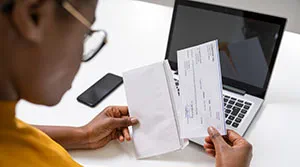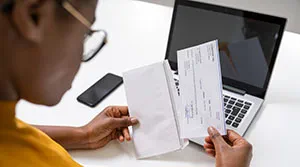Scammers use many tactics to steal money—including paying people with fake checks. The phony checks can look like real business checks, personal checks, cashier’s checks or money orders—and be for large sums of money.
In a fake check scam, a person you don’t know asks you to deposit a check and send money or gift cards to another person. They may say you need to pay taxes or fees or buy supplies.
Common check scams: In these scams, the potential victim gets “paid” by check and receives instructions to deposit it and wire money or buy gift cards, equipment or supplies.
- Mystery shopper – You’re asked to review a business that sells gift cards or money orders or provides money transfers.
- Personal assistant – You apply online and get hired to be a personal assistant.
- Car wrap decals – People interested in car art or advertising are told to deposit checks and send the money to decal installers—who don’t exist.
- Prize winner – You are told you won a prize, receive a check and are asked to send money to cover taxes, handling charges or other fees. That’s not a legitimate sweepstakes.
- Overpayments – People buying something from you online “accidentally” send a check for too much money and ask you to refund the balance.
How To Avoid a Fake Check Scam
While there are many ways a scammer may try to defraud victims, there are a number of steps you can take to help protect yourself from check fraud:
- Verify that the check came from a real financial institution. Call the issuing bank using a number from the bank’s website to verify the check.
- Pass on winnings that require payment. If an issuer says that there’s a processing fee to get a prize, chances are it’s a scam.
- Make sure the written amount is correct. If a check has a higher-than-agreed-upon amount, it could be a sign that the check might be coming from a scammer who will ask for a partial refund before a bank or the victim can catch on to the fraud.
- Drop checks off inside the post office. Scammers sometimes try to steal checks from mailboxes. Dropping a check off in the post office may be more secure.
- Never use money from a check to send gift cards, money orders, cryptocurrency, or to wire money to anyone who asks you to. Many scammers demand that you buy gift cards and send them the PIN numbers, buy cryptocurrency and transfer it to them, or send money through wire transfer services like Western Union or MoneyGram. Once you do, it’s like you’ve given them cash. It’s almost impossible to get it back.
- Toss offers that ask you to pay for a prize. If it’s free, you shouldn’t have to pay to get it. Only scammers will ask you to pay to collect a “free” prize.
What To Do If You Sent Money to a Scammer
Here are ways to try to get your money back, depending on how you paid a scammer.
- Gift card. Gift cards are for gifts, not payments. Anyone who demands payment by gift card is always a scammer. If you paid a scammer with a gift card, tell the company that issued the card right away. When you contact the company, tell them the gift card was used in a scam. Ask them if they can refund your money. If you act quickly enough, the company might be able to get your money back. Also, tell the store where you bought the gift card as soon as possible.
- Wire transfer. If you wired money to a scammer, immediately call the wire transfer company to report the fraud and file a complaint. Reach the complaint department of MoneyGram at 1-800-MONEYGRAM (1-800-666-3947) or Western Union at 1-800-325-6000. Ask for the money transfer to be reversed. It’s unlikely to happen, but it’s important to ask.
- Money order. If you paid a scammer with a money order, contact the company that issued the money order right away to see if you can stop payment. Also, try to stop delivery of the money order: if you sent it by U.S. mail, contact the U.S. Postal Inspection Service at 877-876-2455. Otherwise, contact whatever delivery service you used as soon as possible.
- Cryptocurrency. If you paid with cryptocurrency, contact the company you used to send the money and tell them it was a fraudulent transaction. Ask to have the transaction reversed, if possible.
Report Fraud
Staying up to date on bank activity and not accepting checks from unknown parties can help protect consumers from check fraud. If you see any of these signs in a check you’ve received, don’t cash the check until you’re sure that it’s real. And if you can’t verify that it’s legitimate by calling the issuing bank, consider reporting it. You can notify the bank whose name is on the check, as well as any websites where you encountered the scammer.
You can also report it to the U.S. Postal Inspection Service, your state attorney general and the FTC.
And for online crimes involving fake checks and money orders, you can file an online complaint with the Internet Crime Complaint Center.
